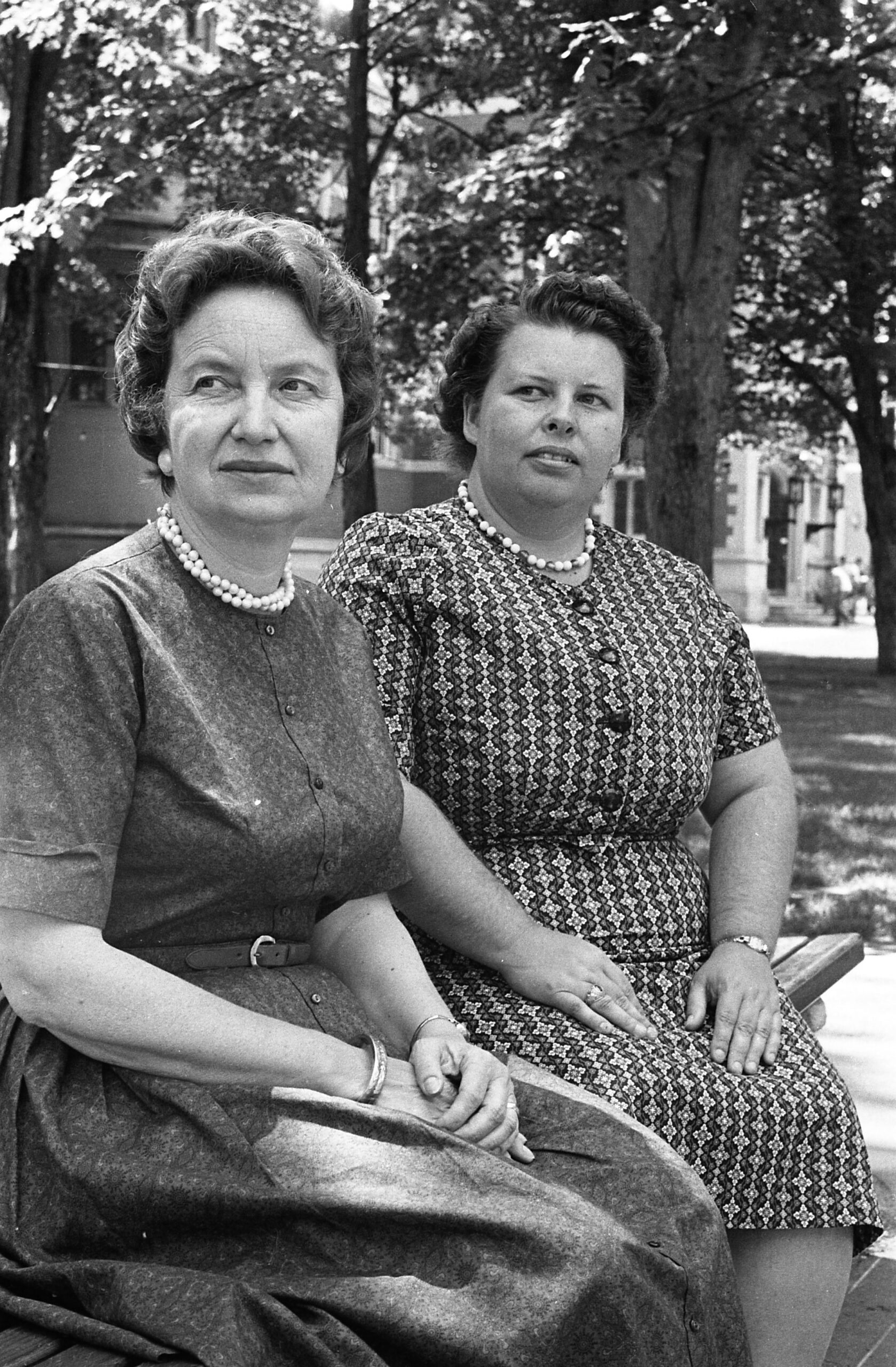Carolyn Mann and the pioneering woman before coeducation
March 29, 2024
 Courtesy of the Special Collections and Archives
Courtesy of the Special Collections and ArchivesIn 1962, Carolyn Mann and Bernice Engler took the stage during Summer Commencement to receive master’s degrees in mathematics. Not only did these women receive a degree that was unprecedented for students to receive at the College, but they also became the first women to earn degrees at Bowdoin. In each subsequent summer until 1973, a total of 58 other women pursuing graduate degrees in mathematics followed in Engler and Mann’s footsteps.
This initiative was funded by the National Science Foundation in an effort to reimagine STEM education programs in the K-12 school systems by providing graduate education for teachers. Within weeks of the Soviet Union launching the first artificial earth-orbiting satellite Sputnik I, the National Science foundation met to propose potential policies to better educate the next generation of scientists and engineers for the Space Race. In accordance, Congress funded the first federally supported summer institutes for teachers, beginning with college professors in 1953 and expanding to high school teachers in 1957.
Even with its political motivations, Bowdoin’s summer institute offered a group of women the opportunity to receive unprecedented levels of education in mathematics at the College. Teachers selected for the program studied at the College for six weeks each summer to be awarded a master’s degree during a special summer commencement ceremony.
In the summer of 1959, Bernice Engler and Carolyn Mann were the first women to embark on this program that changed the course of Bowdoin’s history in coeducation. Bernice Engler G’62 died in 1979, but Caroyln Mann G’62, now 93 years old, resides in Brooklyn, Conn. after a career in high school teaching.
Mann first heard about this program through publicity from the National Science Foundation and applied to Bowdoin after reminiscing about memories she made in her family’s summer cottage in Gardiner.
“There’s a small pond, and we had a summer cottage there for several years. So having become familiar with that area, I thought, ‘Oh Bowdoin sounds like a good place,’” Mann said. “And it certainly was, and I continue to believe that it is a great place to be.”
Although she highly valued her summer experiences at Bowdoin, she also encountered several challenges as one of the first women to live on Bowdoin’s all-male campus.
“I think for some people at Bowdoin, they didn’t quite know what to do to have women on campus,” Mann said. “It was an interesting experience, and I think some of the people at Bowdoin learned how to deal with women as residents on campus.”
Her first concern upon arrival was regarding her living arrangements in buildings designed to only accommodate men.
“Several of those women marched into the appropriate office after having spent the first night—because we didn’t arrive till afternoon—and when [it] got dark, we put the lights on and there were no window shades or any curtains at the windows,” Mann said.
The College provided separate housing for single women during these summer programs and accommodated for married couples as well.
“There were not very many women, and some were married, and their husbands accompanied them. It was arranged so all the women who were single women were on one floor. And then there would be a few nuns, and they were with single women,” Mann said.
In addition to accommodating housing, Bowdoin professors adjusted to teaching a new audience for the summer program.
“It was an all male college, and the professors were all men. Well, there might have been some professor’s wife who might come in and do a course in poetry or something in the English department. But in terms of math, it was all men,” Mann said.
In contrast to her undergraduate studies at the University of Connecticut, Mann felt a notable uncertainty as professors adjusted to coeducation.
“By the time I got [to the University of Connecticut], they were used to having both men and women on campus. And professors were accustomed to having classes with women in them,” Mann said.
Similar sentiments persisted as the College adopted coeducation in 1971. In an opinion article in the Bowdoin Orient, Caroline Boardman ’72 and Miranda Spivack ’73 spoke out about the challenges of entering a college with an institutional legacy that excluded women.
“Bowdoin is still far from being a co-ed institution. It is a men’s college with women,” Boardman and Spivack wrote in the September 17, 1971 edition of the Bowdoin Orient.
Despite these obstacles, Mann admired the quality of her education at Bowdoin and expressed immense gratitude for the experience.
“I think the thing that really stands out, in my mind, was the quality of the teaching from the Bowdoin professors. They were just superb,” Mann said.
Mann noted that it was becoming more common for women at the time to pursue studies in the biological sciences, but rarely in mathematics. Mann recalled being one of few women to take the advanced senior level math at her high school.
“The biological sciences were considered ‘the female sciences.’ You could major in biology, but to major in a hard science such as math or chemistry or physics—that was fairly rare I think at every college. And I think it remains so today,” Mann said.
Mann retired from teaching high school math in 1987 due to unforeseen circumstances, but has remained a lifelong learner through her studies at her local community college’s “Learning in Retirement” classes.
“I’ve been retired for a long time, and I retired earlier than I had any intention of doing, but it was a collection of circumstances that made that the right time. And I don’t regret it. I’ve had a wonderful retirement,” Mann said.

Comments
Before submitting a comment, please review our comment policy. Some key points from the policy: